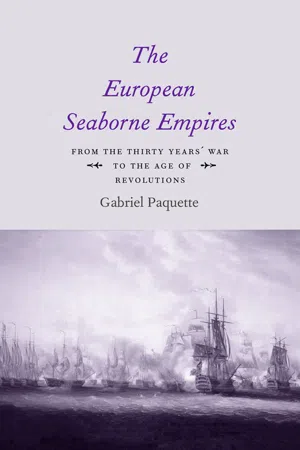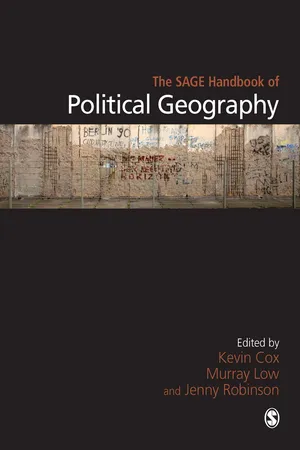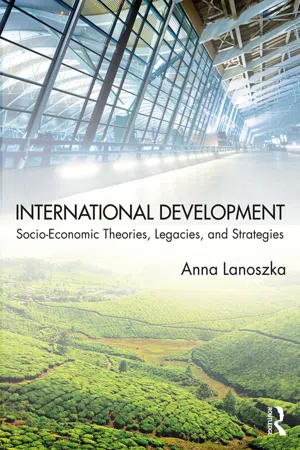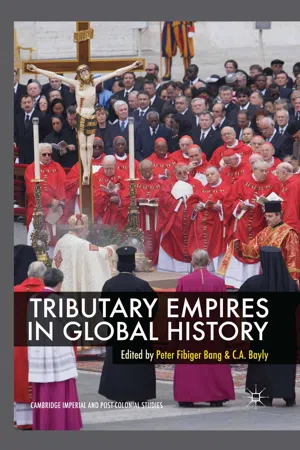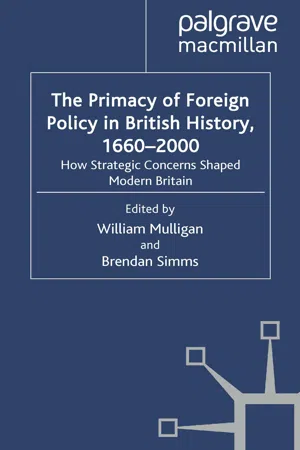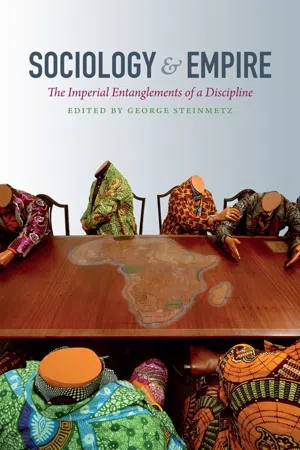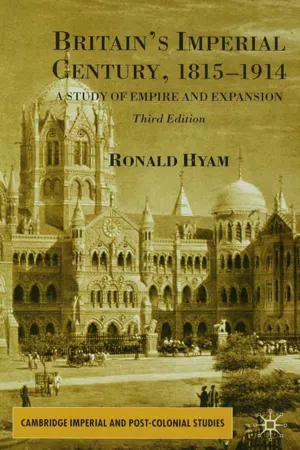History
Colonial Empire
A colonial empire refers to a group of territories or regions that are controlled and exploited by a powerful nation, known as the colonial power. This control is often achieved through military conquest or political dominance. The colonial empire typically involves the extraction of resources, imposition of cultural and social systems, and economic exploitation of the colonized territories.
Written by Perlego with AI-assistance
Related key terms
1 of 5
7 Key excerpts on "Colonial Empire"
- eBook - PDF
The European Seaborne Empires
From the Thirty Years' War to the Age of Revolutions
- Gabriel Paquette(Author)
- 2019(Publication Date)
- Yale University Press(Publisher)
The challenge is largely attribut-able to the variety, range, and complexity of entities that have been designated 18 d e f i n i t i on s o f “ e m pi r e ” “empires” by historians. There have been numerous efforts to arrive at a single definition. Here I mention in passing several of the more successful attempts. These tend to treat empire as emerging from overlapping processes involving the imposition of authority by one group upon another, focusing on the asym-metrical relationship established between them. Historian John Darwin argued that empire is “the assertion of mastery (by influence or rule) by one ethnic group, or its rulers, over a number of others.” Political scientist William Doyle defined empire as “a relationship, formal or informal, in which one state controls the effective political sovereignty of another political society.” Polit-ical scientist David Abernethy distilled empire into the “relationships of domi-nation and subordination between one polity (called the metropole) and one or more territories (called colonies) that lie outside of the metropole ’s boundaries yet are claimed as its lawful possessions.” Mastery, control, domination, and subordination are the prominent, common features of these definitions, with good reason. Historian Stephen Howe encompassed these features in a single definition: “An empire is a large, composite, multi-ethnic or multinational political unit, usually created by conquest, and divided between a dominant center and subordinate, sometimes far distant, peripheries.” 3 I find Howe ’s formulation to be a suitable working definition, provided that it is fleshed out and several caveats are made. First, one must remain cognizant of the violence and unremitting coercion to which subject popula-tions were exposed following the entrenchment of European authority. - eBook - PDF
- Kevin R Cox, Murray Low, Jennifer Robinson, Kevin R Cox, Murray Low, Jennifer Robinson(Authors)
- 2007(Publication Date)
- SAGE Publications Ltd(Publisher)
France’s assimilationist agenda for col-onized peoples, for instance, was replicated (and indeed preceded) within British humanitarian dis-course, but countervailing British practices of seg-regation and indirect rule distinguished the two empires in the late nineteenth-century (Fieldhouse, 1982). While comparative, general theories and sur-veys of imperialism are significant in helping us to contextualize different episodes in empire construction and decline, they often end up gen-erating semantic debates over the proper def-initions of terms such as ‘empire’, ‘imperial-ism’ and ‘colonialism’ rather than contributing to our appreciation of how the people involved understood and experienced these episodes of cross-cultural encounter. Even where the calcu-lations of imperial statesmen ( sic ) take centre stage, the existence of other, often competing, imperial and colonial interests, let alone colo-nized subjectivities, is rarely taken into account in the generalized historical-sociological literature on empire. Historical geographers have produced much work of late that does attempt to uncover the conflicts, accommodations, negotiations and refor-mulations of power relations, both material and cultural, that imperialism and colonialism fostered in different sites across the globe (see Clayton, 2000; Lester, 2001; Blunt and McEwan, 2002; Yeoh, 2003, for some examples, and Clayton, 2002, for an excellent overview). But in this chapter, rather than explore the geographies of particular colonial encounters as these studies have, I want to take a recent resurgence in the use and discussion of the term ‘Empire’ as my main focus. I intend to explore how both historical geogra-phers of colonialism and scholars of contemporary geopolitics can contribute to a current debate on ‘Empire’ by connecting past and present in more meaningful ways. - Available until 25 Jan |Learn more
International Development
Socio-Economic Theories, Legacies, and Strategies
- Anna Lanoszka(Author)
- 2018(Publication Date)
- Routledge(Publisher)
By the beginning of the sixteenth century, imperial competition between Spain and Portugal was fast accelerating. In 1521, Cortez conquered the Aztec empire, paving the way for the eventual Spanish conquest of a territory known today as Mexico. 7 For the next 400 years Europe would strive to control most of the globe. According to a major study, in 1800 European powers controlled one-third of “the world’s land surface,” two-thirds by 1878, and four-fifths (or just over 84 percent) by 1914. 8 The period of European domination lasted over several centuries. This is why it is helpful to clarify the terms used, such as imperialism, colonialism, and neocolonialism: “whereas colonialism means direct rule of people by a foreign state, imperialism refers to a general system of domination by a state (or states) of other states, regions or the whole world.” 9 Neocolonialism is more elusive as a term. Following an observation of one scholar, it is a peculiar kind of relationship that translates to “inequitable ties” of former colonies with a world economic order. These ties, which long outlived independence, are the result of the colonial experience. 10 To put it more expressively: To African nationalists neocolonialism does not mean the imposition of new forms of alien control from outside Africa; rather, it is the persistence of residual European influence in Africa itself. Moreover, it is not direct political control or influence that is the irritant, but the omnipresent cultural influence of the West, which saturates all aspects of life. 11 The above definitions serve to distinguish among the three stages of European expansionism. The first phase, characterized by imperialism, stretched from 1415 to 1776. The second phase involved the formal establishment of colonies. It lasted symbolically until 1945, when the end of World War II marked the beginning of the formal decolonization period - eBook - PDF
- Peter Fibiger Bang, C. A. Bayly(Authors)
- 2016(Publication Date)
- Palgrave Macmillan(Publisher)
This is the case with the definition given by S. M. Eisenstadt, according to whom: an empire is a political system which is strongly centralised and covers a large territory. The centre of that system forms a separate, controlling whole with respect to the remaining areas, and the power is in the hands of the emperor and central offices. 1 Empire may also be defined in general terms as a political organisation which wields power over states (as a “state of states”), where the centre controls the subordinated areas through military, political and ideological means. A characteristic feature of an empire is the existence of internal diversity, coupled with the aspirations of the ruling group to order the world known to that group according to the religious, ideological or political principles developed in the centre. Those aspirations are one of the reasons for the expansiveness of empires. 2 Such general definitions do not diminish the importance of the second option, which consists in considering a typology of empires and introduc- ing more detailed criteria to distinguish between different forms of empires and variation over time. So, for example, in the historical and political sci- ence literature we may find described and defined as distinct: the ancient Imperium Romanum, the medieval Imperium Christianum, early modern seaborne empires, nineteenth century Colonial Empires, twentieth century totalitarian empires etc. 3 Two opposite theories link empires with the exist- ence of separate world-economies. According to F. Braudel and E. Wallerstein, an empire may be the political expression of a world-economy. 4 R. Kamen and J. Kieniewicz, however, give examples of empires which transgressed the Early Imperial Formations 109 borders of one and mobilised the resources of two or more separate world economies. 5 For example, the Mongolian empire or the Portuguese seaborne empire. - eBook - PDF
The Primacy of Foreign Policy in British History, 1660–2000
How Strategic Concerns Shaped Modern Britain
- William Mulligan, Brendan Simms(Authors)
- 2010(Publication Date)
- Palgrave Macmillan(Publisher)
13 Imagined Spaces: Nation, State, and Territory in the British Colonial Empire, 1860–1914 Duncan Bell The old colonial system is gone. But in its place no clear and rea- soned system has been adopted. The wrong theory is given up, but what is the right theory? There is only one alternative. If the colonies are not, in the old phrase, possessions of England, then they must be part of England; and we must adopt this view in earnest. J. R. Seeley, The Expansion of England: Two Courses of Lectures (1883) During the late Victorian age, and deep into the twentieth century, a fierce debate raged among members of the British political and intellectual elite over the future of the empire. 1 Could it be adapted to new economic, social, and political circumstances? What form should it take? Fear about the future was generated by concern over both the domestic consequences of demo- cratic reform and about Britain’s precarious geopolitical position. Britain’s status as a global power was at stake. Democratic reforms, first in 1867 and then more radically in 1884, reshaped the political landscape. Large num- bers of the (male) population were enfranchised, while socialism became an ever more popular and vocal force. For many advocates of empire, these developments were dangerous as the mass public was thought to harbour anti-imperial sentiments. The problem was reinforced by various geopolit- ical trends, and above all the rise of three main competitor states. First, post-unification Germany was well on the way to becoming the dominant power on the continent, and it appeared keen to flex its muscles on the global stage. Second, Russia was seen as a major threat to the British Empire in India, and thus to British power globally. And finally, the post-civil war dynamism of the United States challenged British economic dominance. It also emerged as a formidable geopolitical competitor as it embarked on its own foreign imperial adventures in the 1890s. - eBook - PDF
Sociology and Empire
The Imperial Entanglements of a Discipline
- George Steinmetz(Author)
- 2013(Publication Date)
- Duke University Press Books(Publisher)
Slavery, the “peculiar institution” of the fi rst Colonial Empire, was replaced by modern colonial domination—the economic, po-litical, and cultural domination of indigenous subjects. The difference between the two empires eventually became part of the offi cial rhetoric of colonization and provided a rationale for the conquest of sub-Saharan Africa as a way of purging it of indigenous forms of slavery. After 1848, legal, economic, and cultural “assimilation” prevailed in the old colonies and led to their formal incorporation as French departments in 1946 (Mam-Lam-Fouck 2006). In the colonies of the second empire, in 324 · Historical Studies of Colonialism & Empire contrast, the French state implemented a range of strategies to ensure their continued differentiation from the metropolitan center. The vast territories conquered after 1830 in Africa, the Pacific Ocean, and Asia were thus treated very differently than the earlier acquisitions. Th roughout the nineteenth and early twentieth centuries, consequently, the French empire was divided sociolog ically and politically along several major lines and was very heterogeneous across them. The empire comprised departments, colonies, protectorates, and other forms of rule. These had diverse legal and administrative statuses, reflecting in part the evolution of the legal theories of sovereignty and a change in poli-cies at the turn of the century from “assimilation” to a looser link of “associa-tion” (Betts 1961). Administrators (and, later, historians) also distinguished between “settler colonies” ( colonies de peuplement ) and “exploitative colo-nies” ( colonie d’exploitation ), with significant implications on forms of gov-ernance and the orga nization of colonial society (Elkins and Pedersen 2005; Stoler 1989). Algeria was the model of full political integration. After 1848, it was governed as a set of three departments that were constitutionally part of the French territory. - eBook - PDF
Britain's Imperial Century, 1815-1914
A Study of Empire and Expansion
- R. Hyam(Author)
- 2002(Publication Date)
- Palgrave Macmillan(Publisher)
The newly enhanced competence of the state-machine became a timely weapon in the 'search for stability' within the empire. 'The colonial state' is now the stan- dard descriptive term for these cosmoplastic processes. In many ways the key to the grip of the colonial state was a result of its unprecedented collection of information. 'Knowledge is power', that famous Oxonian precept, reached an apotheosis as the colonial state gathered and controlled a veritable 'information explosion', and coupled it with a systematic determination to classify and categorise indigenous peoples and evaluate their countries. The first census was held in India in 1871-72, and an ethnographic survey was planned as part of the 1901 census on the grounds that it was 'as necessary an incident of good administration' as land The Dynamics of Empire and Expansion 311 survey. 51 India, however, was comparatively lightly governed by western administrators, and a more finished version of the colonial state emerged only in Malaya 52 and Mrica. Two metaphors are available for describing the colonial state: the New Leviathan,* and Bula Matari. Crawford Young has suggested that the terrifying and relentless force of alien domination is well captured in the Bakongo term Bula Matari, 'he who crushes rocks'. 53 Of course that was not how European administrators saw it. For men like Sir Hesketh Bell, governor of Uganda, or Sir Frank Swettenham in Malaya, it was a process of 'lighting the dark places', through 'wise and benevolent guardianship'. 54 Swettenham defined his aim as to open up the country br 'high-class roads, rail- ways, telegraphs, waterworks' (1895). 5 Railway-building was usually the most important capital expenditure and achieve- ment of the colonial state: 32,000 miles of track in India by 1910, 1600 miles in Burma, 500 miles in Malaya. This New Leviathan, although far from omnipotent, brought profound changes to indigenous peoples.
Index pages curate the most relevant extracts from our library of academic textbooks. They’ve been created using an in-house natural language model (NLM), each adding context and meaning to key research topics.
